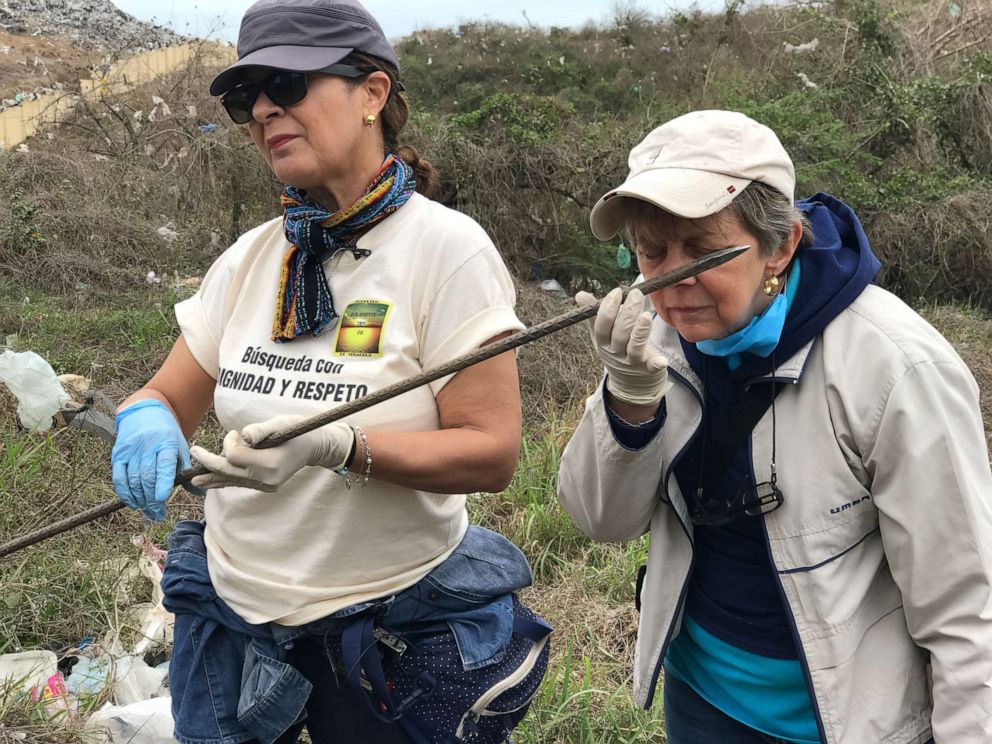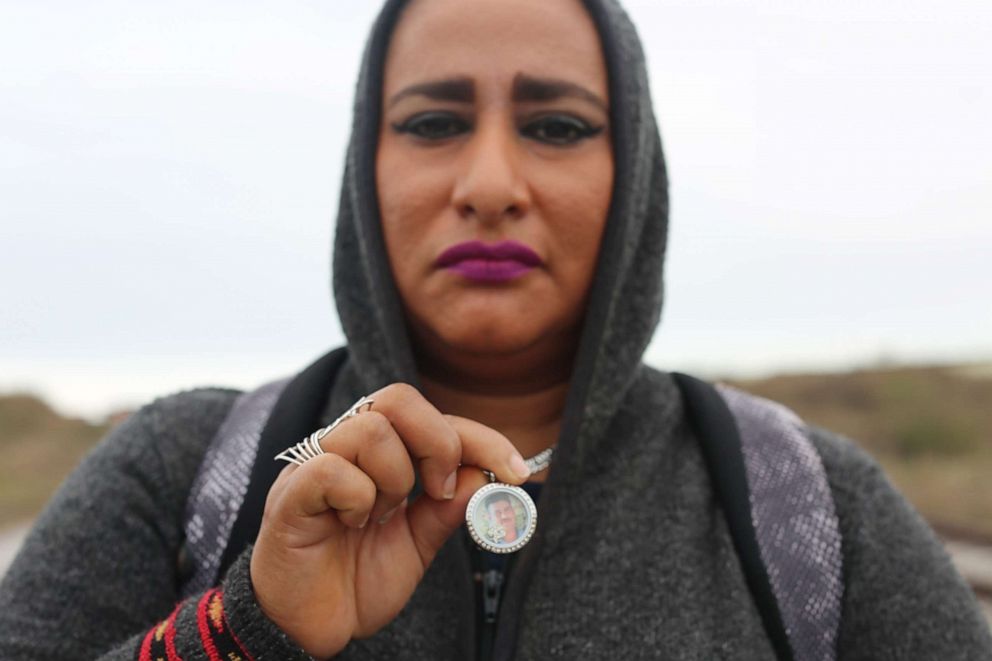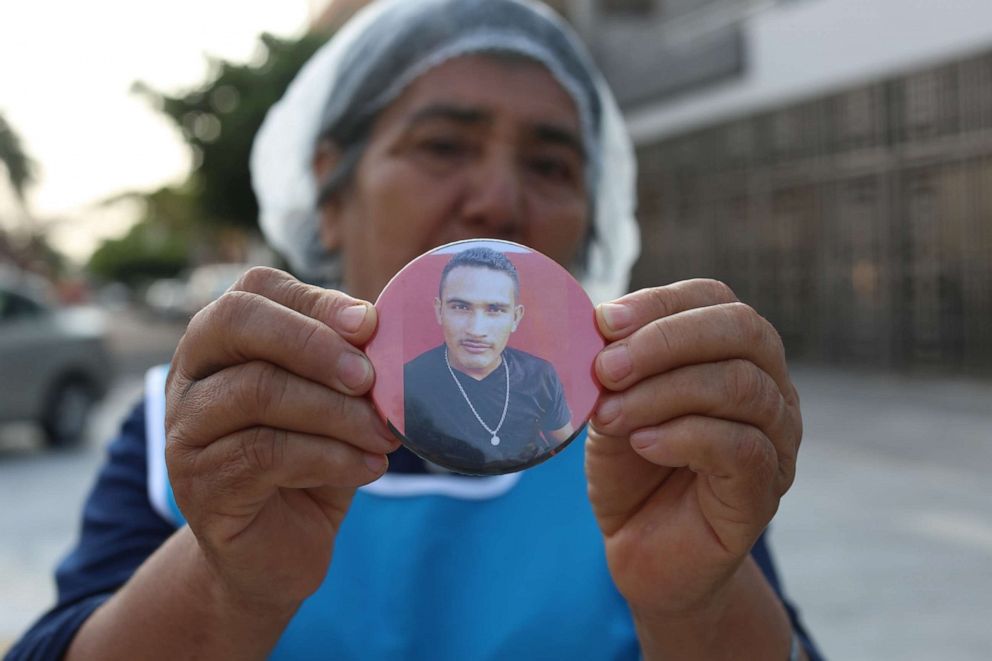A sorority of mothers in Mexico search mass graves in hopes of finding missing children's bodies
The mothers' collective has spawned a national movement to find lost children.
Lucy Diaz carefully studied the ground beneath her, looking for patches of loose earth and wondering if she would discover the worst in her ongoing search for her missing son, Luis.
"When there's a body, the ground is kind of loose," Diaz said.
Diaz hammered a long metal construction rod into the ground, then smelled the end of it when she pulled it back out. It's something she's done time and again -- hundreds of times -- in hopes that it will lead to a body.
"Once we hit underground, usually a meter-and-a-half [to] 2 meters deep, we smell this bar, and then [search for]…the smells [of] a dead body," she said. "Sometimes, not only the smell but the sound. Once I was hammering this and I started to hear like a rattle underneath because it was not exactly breaking the bone but making the noise rubbing against the bone, and there was a body."

In Veracruz, Mexico, she said, it's "extremely likely" that she was standing on a mass grave in that moment, and she is one of hundreds of other mothers on the same mission to find their missing relatives' bodies.
"All the moms say, 'Till my dying day,'" Diaz said. "We're going to fight for our children. There's nothing [that's] going to stop us."
The state of Veracruz is known as "Mexico's graveyard" because of the number of mass graves uncovered there.
Diaz acknowledges that it should be law enforcement's job to investigate crimes and uncover bodies. But, she said, "This is Mexico."
"Keep that in mind. All your questions can be answered with that: 'This is Mexico,'" she added.
War and violence in Mexico has reached record levels this year, as drug cartels have waged open gun battles in the streets across country, including in tourist destinations.
By conservative estimates, more than 200,000 Mexicans have been killed and more than 40,000 Mexicans have been reported missing in Mexico since 2006, according to Mexican government officials, though the actual number is unclear and could possibly be double or triple that, said Karla Quintana, head of the National Search Commission, which was established last year to provide support to families looking for missing relatives.
"We know that…lots of disappearances are not taken to authorities," Quintana said. "[Victims' families] are afraid of the same authorities in some cases or the organized crime -- the cartels."
Without the help of authorities, the desperate task of searching for missing loved ones has often fallen to those most committed to their children: mothers. The National Search Commission reported that there are currently 3,024 clandestine graves in Mexico.
"The government…they don't care much about who has been disappeared," Quintana said. "There is this stigma in Mexico…that if someone is disappeared, it's because they were doing something [bad], they were involved in something [bad], which is not true."
Lucy Diaz said she was leading a comfortable life as a college professor and mother of three. She was married to a successful businessman. But she said it all changed one Saturday night in 2013 when her 29-year-old son Luis Diaz vanished.
"I don't even know what happened to him," she said. "At this point, five-and-a-half years, and I have no idea of his whereabouts. I know that he was kidnapped but that is all I know."
At the time, she said her son was a popular DJ in the city of Veracruz, where he'd become a staple at weddings and local parties.
"He was so passionate about his music and then something like this happened, and I just, I could give him my life," she said.
On that Saturday night in 2013, Lucy Diaz said she got a call from her son's girlfriend, who said she hadn't heard from him in a couple of days. Lucy Diaz called one of her son's employees who promised her that her son was busy at a gig.
That following Monday, when she still didn't hear from him, Lucy Diaz said she knew something was wrong.
"He knows I get crazy whenever…I cannot get in touch with him," she said. "Then I received a message from his phone saying that he was OK -- not to worry."
Lucy Diaz said she received a message from her son's phone saying he would call her tomorrow. But when she didn't hear from him at all the next day, she said, "I knew for a fact that it was terribly wrong. Something was terribly wrong."
"And that's the beginning of this trip to hell that doesn't have an end," she added.
Lucy Diaz said she went to the police, who told her they spoke with Luis Diaz's employee, who told them that her son was fine. But then she said the employee confessed to lying.
"He broke down and said, 'No, somebody kidnapped him. I was in the office. I was in the office and he was in his bedroom, and I saw them come in.'" Lucy Diaz said of the employee.
She said the employee had sold Luis Diaz's phone after he was kidnapped. No charges were ever brought against the employee and Luis Diaz's case remains unsolved.
"Is [the employee] in jail? No. As free as a bird," Lucy Diaz said. "Who's in jail? Me. I'm in the worst jail there is."
Last year, police uncovered a potential break in the case when they found an individual riding Luis Diaz's motorcycle. But when Lucy Diaz followed up with Veracruz authorities to ask if they had questioned this person, she said they told her "not yet."
"I say, 'What are you waiting for? Another year to go and interrogate him? And then when are you going to put him in jail or do something?" she said. "They still haven't interrogated him."
To Lucy Diaz, it's not authorities being lazy, "it's corruption," she said.
She firmly stated that her son was not connected to the drug trade nor the cartels. She said authorities "don't really want to solve the problem. They don't want to find the person."
Unwilling to accept local authorities' inaction, Diaz became a very public critic of them -- a risky move in a deeply corrupt country.
"I've never been a coward," she said. "People…tell me, 'Are you afraid…because [there are] so many dangers out there and you are so outspoken against the government.' … I say no…I already lived life."
Diaz underwent a transformation, from depression to anger to, finally, something much larger. She has now organized hundreds of other mothers who are searching for their children in Veracruz.
Their pain has turned into a grassroots movement that they dubbed "Colectivo Solecito," which means "Collective of the Little Sun." This sorority of mothers, united around a wrenching mission, raised money for their cause by selling tamales at a local carnival. They then use the money to chase down leads that they gather from anonymous tipsters and launch search missions.

All of these mothers had similar stories to Diaz's. Margaretta Gutierrez said her son, Lucio Maldonado, disappeared in 2015. Consuelo Castillo said she was looking for her 38-year-old son Saul Alejandro Respardo. Rosalia Castro said her son, Roberto Carlos Casso Castro, disappeared in 2011.
"When we're en route to search, we go with mixed emotion," Rosalia Castro said. "Because we want to find something. But at the same time we don't want to find our [children] there."
For Lucy Diaz, the struggle to find her son has taken over her life. She quit her job as a professor and now balances her time between working on behalf of all the mothers searching and doggedly pursuing her son's case.
"I do get fed up," Lucy Diaz said. "I get all this disappointment and I feel...down, depressed. But then I pick myself up very quickly… I just have to say to myself,'You have to keep going. You can't stop.'"
As for government support in solving these types of cases, Quintana acknowledged that "the Mexican justice system is very poor." Out of tens of thousands of disappearance cases, only 30 have been resolved in court.
"Specifically regarding people that are disappeared, we only have 30 judicial decisions in Mexico," she said.
The mothers' movement has become a national rallying cry. Nearly 300 miles away from Veracruz, in the state of Guerrero, mothers were wearing placards of their missing children around their necks as they searched the rugged terrain for remains.
Guillermina Sotelo said her son vanished one day, as if the earth swallowed him whole. As she walked and looked for signs of bodies, she said, "When I am here I feel that I am with him -- with my son."

"When I leave, I leave with sadness," she said. "I feel when I leave that I am leaving him. But I have to leave because I have a family, I have my grandchildren…but something is missing. I have to be here, I have to look for my son."
Even when the mothers find a body, though, it can often be difficult to properly identify them.
While some local morgues around the country are capable of genetic analysis, many are not, which means it's up to the federal police's scientific division to process the cases. At one of their facilities, however, there are only 25 lab technicians working on identification.
"Bone analysis is very slow because the quality of the samples are poor… They have small DNA. Very, very poor samples have little DNA," said one lab technician, adding that they're constantly thinking of the families when they have to process these unsolved cases.
"For us, it's very easy to know the persons, because we go to the sites and take samples from them, hear [their] histories. We know [their] pain," the technician said.
Before he was elected last year, Mexican President Andres Manuel Lopez Obrador campaigned on a platform of helping the families of those who've disappeared. When ABC News spoke with him about Lucy Diaz's case, he said, "From this moment, as you are asking, this case will be handled directly by the subsecretary of the government and will get in contact with the woman who is asking for help."
"In this country, things have changed a lot and we will protect all of the people," he added.
It's now been nine months since Obrador promised to intervene in Diaz's case, and so far, she said she hasn't gotten so much as a phone call. Still, she remains somewhat optimistic.
"Well, one thing is funny, but victims, we are very optimistic all the time," she said. "Otherwise we'd be really paralyzed with disappointment and fear."

